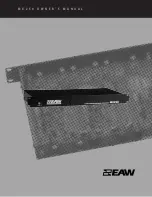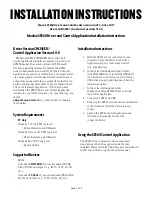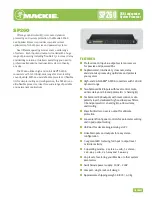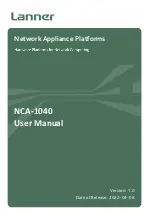
11. OPERATING INSTRUCTIONS
-
DISCHARGE
11.1 Gearbox Speed Selection
IMPORTANT.
The machine is fitted with a 2
-
speed
gearbox. For blockage free operation it is important that
the correct gearbox speed is selected for the material
being discharged as shown in Table 4. The gearbox has a
neutral position between high and low, so make sure the
required gear has been properly selected so as not to
block the rotor housing.
Table 4. Recommended Rotor Speed
NOTE.
Dual Chop machines cannot chop silage or
materials with high moisture content.
For shredding straw and other dry materials either rotor
speed may be used, for maximum throw distance high
speed should be selected on the rotor gear box with the
handle moved towards the position marked by the hare to
give a 1:1 ratio between PTO and discharge rotor speeds.
For shredding silage and other wet materials it is
recommended that low rotor speed be used since long
throw distances are not usually required. To select low
rotor speed, the gearbox handle should be moved to the
position marked by the tortoise to give a 1.85:1 ratio. The
machine may be used at reduced PTO speeds and still
deliver material to the desired position. Low PTO speeds
should be used with caution as a blockage in the rotor
housing may result. Do not operate with a PTO speed less
than 300 rpm.
11.2 Right Hand Chute
Adjust the position of the chute to deliver material to the
desired location, typically this will be down beside the
machine for feeding and elevated for bedding.
11.3 Sloping Swivel Chute
The swivel chute rotates through 280 degrees and can be
operated to either side of, and behind the machine.
To deliver silage close to the machine, position the chute
so that material is delivered onto the feed passage slide.
The position of the slide can be adjusted to deliver the
material accurately. Alternatively the position of the
material can be controlled by the chute, it may be
necessary to rotate the chute fully delivering material
alongside the drawbar.
IMPORTANT.
The discharge of baled silage along the
left hand side of the machine is not recommended.
In transport, rotate the chute to the right hand side of the
machine aligning the indicators on the chute and top
housing. Fully lower the deflector to keep the width and
height of the machine to a minimum.
11.4 Dual Chop Operation
NOTE.
Dual Chop machines cannot chop silage or
materials with a high moisture content.
The Tomahawk 8555 with removable screen can be used
to dispense clamp silage and distribute baled silage
without chopping. This can be achieved with the blade
beam raised, screen removed and replaced with a screen
blanking frame which prevents a build up of material in the
screen support frame.
The sliding blade carrier is controlled through the hydraulic
spool valve. An indicator attached to the blade beam
shows the engaged / disengaged positions of the sliding
blade carrier.
When a long chop length is desired, raise the blade carrier
thus disengaging the blades.
When a fine chop length is desired, lower the blade carrier
fully
to engage the blades against the crossbeater and put
the gearbox in low discharge speed. Before lowering the
blade carrier, stop the bed chain and wait for the material
to stop flowing into the rotor.
Do not use intermediate positions as damage may occur.
11.5 Tomahawk 8555 Screen Change
DANGER.
Never attempt to change the screen
unless the PTO has been disengaged, the engine
has been stopped with the key removed from the ignition,
and the machine has come to rest.
To change screen, release the anti luce pins from the
right hand side of the machine and withdraw the screen
from the machine. Before fitting the replacement screen
check the lower guide groove of the support frame is free
from material using the blockage removal tool. Access to
the frame on the left hand side of the machine is inside
the chain guard. Displace the cover to gain access.
An optional screen storage frame is available where the
screen is changed regularly.
11.6 Starting The Machine
Switch the control desk on. Engage the hydraulic spool
valve on the tractor making sure the bed chain has not
been started.
Position the selected chute and deflector to give the
desired spread direction.
Engage the PTO with the tractor engine at idle speed and
increase the speed rapidly to working speed (540rpm)
when the tractor clutch has engaged fully.
It is important to ensure that the rotor is turning at full
working speed before engaging the bed chain. Failure to
do so is likely to result in a blockage.
11.7 Before Commencing Discharge
If the machine is loaded to capacity with bales, the tailgate
must remain horizontal until the material in the body has
been discharged. This is necessary to allow material within
the body of the machine to rotate freely once it comes into
contact with the crossbeater(s). No attempt should ever
be made to force material towards the crossbeater(s) using
the tailgate.
With the bed chain speed dial on the control desk set to
zero, switch the bed chain on in the forward direction by
pressing the bed chain forward button once. General
discharging instructions follow after the specific round/
square bale and clamp silage instructions below.
19
Material
Discharge
Distance
Gearbox
Speed
PTO Speed
Straw
Maximum
High
540
Straw
Close
High
300
Baled Silage
Close
Low
540
Clamp Silage
Close
Low
300
Summary of Contents for Tomahawk 1010
Page 1: ...30417 10100 11 19 30970 10345 31725 11338 10056 3694 TMKBXOP1119A ...
Page 38: ...NOTES 35 ...
Page 39: ...36 NOTES ...
Page 40: ......















































